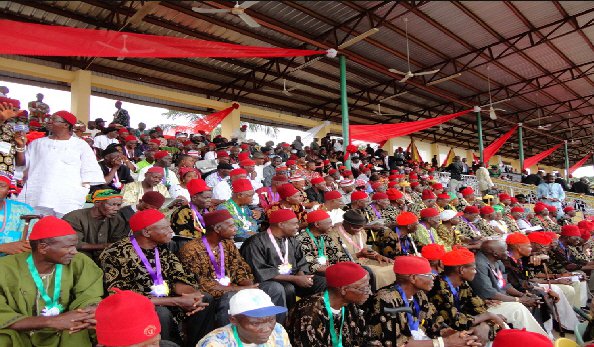Capital of Owerri province — Page 269
Appendix 2 Page 246
Port-Harcourt Parliamentarians from 1945 – 1966
Appendix 3 Page 247
Port Harcourt Municipal Councilors 1955 —- 1958
[b]D.D.”Diobu” Nsiegbe Ikwerre Ibo Port Harcourt Division
J.W. Ogbondah Ikwerre Ibo Diobu Port Harcourt Division
Appendix 4 Pages 248—250
Port Harcourt Municipal Councilors 1958 — 1961
E Aguma: Ikwerre Ibo Diobu Port Harcourt Division
M.W. Dickson: Ikwerre Ibo Diobu Port Harcourt Division
G.P.A. Nwagwu: Ikwerre Ibo Diobu Port Harcourt Division
J. A. Otuonye: Ikwerre Ibo Diobu Port Harcourt Division
R. O. Owuru Ikwerre Ibo Diobu Port Harcourt Division
Appendix 5 Pages 251 – 253
Port Harcourt Municipal Councilors 1961 – 1964
S.W. Atako: Ikwerre Ibo Port Harcourt Division
R. Chikere Ikwerre Ibo Port Harcourt Division
E. Chukwu Ikwerre Ibo Port Harcourt Division
Chief Joseph Wobo Ikwerre Ibo Port Harcourt Division[/b]

Additional information can be extracted from the sources indicated above. The people have maintained that they are Igbo even when they were in Ricers Province.
As regards the name Ikwerre emanating from the people in a chorus “Ekwelam” we have agreed when Sir F.D. Laggard, the then Governor of Southern Nigeria asked the people a question, if they have agreed for their land to be used for the sea port and railway terminal through an Igbo interpreter is ludicrous and the greatest fabrication of the century. There was no Igbo interpreter or other Ikwerres from Isiokpo, Igruta, Elele or any other Ikwerre towns or villages that was associated with the negotiations for acquiring land for development of Port Harcourt that resulted in HAGROVE AGREEMENT of 1912, but Diobu people who are the owners of the land. The records indicated that Chief Daniel Kalio, the head of Okirika chiefs and and his assistant chief Samson Adoki were the interpreters. Chief Kalio was the chief negotiator for the colonist. He was paid three thousand for his services. The lands acquired for the terminal and seaport were Diobu farm lands of Iguocha and Obomotu. Iguocha and Obomotu are Ikwerre Ibo names.. The negotiations took place at chief Wobo and chief Atako compounds respectively.
In Sir Lugar’s dispatch No. 103, paragraph 10 to the secretary of state for the colonies he said, Inter alia:
“I have already taken steps to acquire the land before fictitious claims and artificial inflations should have increased the difficulty of acquisition. The occupiers belong to a single village named Diobu ——“
It did not mention Ikwerre but Diobu, even though Diobu is in Ikwerre a southern Igbo ethnic group. An Ikwerre man from Isiokpo, Iguruta, Choba etc, has nothing to do with land in Diobu. Land tenure in Igbo land including Ikwerre is based on family, linage, and village.
In another dispatch to the Secretary of State for the colonies dated August 1913, Lord Lugard stated that Iguocha and Obomotu are the lands on which the seaport and the terminal shall be built. He added that Iguocha and Obomotu are Ikwerre Ibo Names.
The Willinkson Commission of 1958
As it relates to Port Harcourt and ethic make up of Rivers Province, the Commission Stated in Chapter 5 of its report as follows:
“The Rivers Province was a recent formation and was designed to meet local standing complains of the people ———. It includes the two divisions of Brass and Degema both overwhelming Ijaw and Ogoni Division inhabited, almost entirely by a tribe of the same name. The former Rivers province also including 300, 000 Ibos of which 250,000 are in Ahoada Division and 45,000 Port Harcourt towns. Port Harcourt town is a town of recent growth and rapidly increasing importance. It is built on land originally belonging to outlaying branch of the Ibo tribe.”
Dr M.D. Amadi’s article sent on June 12, 2013, to Mr. Emeka Okala the Clearing House for None =Ikwerre Igbo for publication touched on several issues that do not relate to the subject matter in question. However, efforts shall be geared to addressing relevant topics of Ikwerrre being an integral part of Igbo land with very few exceptions. I shall also attach my earlier comments on this matter with the hope that the question thereto shall be addressed.
It is untrue that the hinterland Igbo calls Ikwerre people Di – ali and the Ikwerres call the Igbo Isuama. Di-ali is a southern Igbo word. It has several synonymous with Di-ala, and nwadiala. They all mean indigenous, free born, not a stranger, etc. An Ikwerre is di-ali in Ikwerre land; an Ngwa, Umuahia, and owerri are di- ala in their place or ethnic group respectively.
Isuoma means stranger, none indigenous. It is derogatorily used on migrant or seasonal laborers by Owerri, Ikwerre, Etche and Ngwa people. The Ngwa and Asa people interchange that word with Nwa-Ohuhu. “Mbara” is how Ikwerre people end their music. I have not heard Ikwerre people called that name. People may make fun of it. The use of







